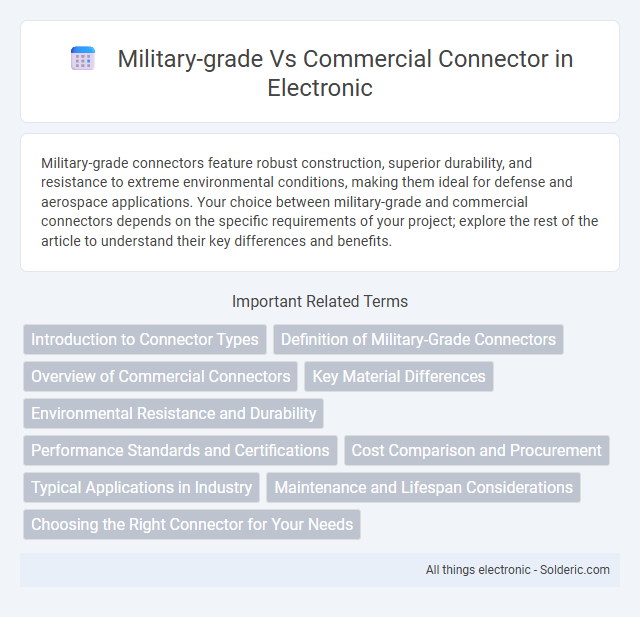Military-grade connectors feature robust construction, superior durability, and resistance to extreme environmental conditions, making them ideal for defense and aerospace applications. Your choice between military-grade and commercial connectors depends on the specific requirements of your project; explore the rest of the article to understand their key differences and benefits.
Comparison Table
| Feature | Military-Grade Connector | Commercial Connector |
|---|---|---|
| Durability | High resistance to shock, vibration, and extreme conditions | Standard durability, suitable for general use |
| Material Quality | Used with rugged materials like stainless steel and anodized aluminum | Commonly made of plastic or basic metals |
| Environmental Resistance | Waterproof, dustproof, corrosion-resistant, meets MIL-STD-810 | Limited environmental sealing, not rated for harsh environments |
| Electrical Performance | High conductivity, stable signal integrity under stress | Standard electrical specifications for everyday devices |
| Cost | Higher cost due to rigorous testing and certifications | More affordable, mass-produced for consumer markets |
| Applications | Used in defense, aerospace, and other critical applications | Consumer electronics, automotive, and general industrial use |
| Connector Standards | Complies with MIL-DTL-38999, MIL-DTL-5015, etc. | Complies with commercial standards like USB, HDMI, RJ45 |
| Maintenance | Requires regular inspection and specialized handling | Low maintenance, plug-and-play design |
Introduction to Connector Types
Military-grade connectors are engineered to meet rigorous standards for durability, environmental resistance, and reliability in extreme conditions, often featuring robust materials like stainless steel and specialized sealing mechanisms. Commercial connectors, while suitable for everyday applications, prioritize cost-effectiveness and ease of use but may lack the stringent qualifications required for military use. Your choice between these connector types depends on the critical demands of your project, including exposure to harsh environments and the need for long-term performance assurance.
Definition of Military-Grade Connectors
Military-grade connectors are ruggedized electrical connectors designed to meet strict defense standards for durability, environmental resistance, and performance under extreme conditions. These connectors comply with military specifications such as MIL-DTL-38999 and MIL-STD-810, ensuring high reliability in harsh environments including extreme temperatures, shock, vibration, and moisture. Unlike commercial connectors, military-grade options provide superior sealing, corrosion resistance, and mechanical strength, making them essential for aerospace, defense, and tactical applications.
Overview of Commercial Connectors
Commercial connectors are designed primarily for consumer electronics and general industrial applications, offering cost-effective and readily available solutions with standardized specifications. These connectors typically prioritize ease of use, mass production, and compatibility but may lack the rigorous durability, environmental sealing, and vibration resistance found in military-grade counterparts. Your choice of commercial connectors suits environments with moderate mechanical stress and less demanding performance requirements.
Key Material Differences
Military-grade connectors are typically constructed from high-strength materials such as stainless steel, aluminum alloys, and reinforced thermoplastics to ensure durability, corrosion resistance, and reliable performance under extreme environmental conditions. Commercial connectors often use standard plastics, zinc alloys, or less robust metals, which provide adequate performance for everyday applications but lack the rigorous specifications of military-grade counterparts. When selecting your connector, understanding these key material differences ensures you choose components that meet the necessary strength and reliability standards for your specific application.
Environmental Resistance and Durability
Military-grade connectors offer superior environmental resistance, designed to withstand extreme temperatures, vibration, moisture, and corrosion, ensuring reliable performance in harsh conditions. Their durability is enhanced by robust materials like stainless steel and specialized seals, providing long-term functionality even in combat or aerospace environments. Commercial connectors typically use less rugged materials, making them more vulnerable to environmental stress and less suitable for critical or demanding applications.
Performance Standards and Certifications
Military-grade connectors comply with rigorous performance standards such as MIL-DTL-38999 and MIL-STD-810, ensuring durability under extreme environmental conditions including vibration, moisture, and temperature variations. Commercial connectors typically meet industry standards like IEC and UL, which focus on general safety and electrical performance but lack the stringent environmental testing required for military use. Certifications for military connectors guarantee reliability in critical applications, whereas commercial connectors prioritize cost-effectiveness and broader market compatibility.
Cost Comparison and Procurement
Military-grade connectors typically incur higher costs due to stringent specifications, enhanced durability, and rigorous testing standards required for defense applications. Commercial connectors offer a cost-effective procurement option with widespread availability and faster lead times, making them suitable for less demanding environments. Budget planning must consider long-term reliability and compliance requirements, where military-grade connectors justify their premium through reduced failure rates and maintenance expenses.
Typical Applications in Industry
Military-grade connectors are engineered for extreme conditions, commonly used in aerospace, defense, and heavy equipment industries where durability and reliability under harsh environments are crucial. Commercial connectors, found in consumer electronics, automotive, and general industrial automation, prioritize cost-effectiveness and ease of integration for moderate operational demands. Your choice between these connector types should align with the specific environmental and performance requirements of your application.
Maintenance and Lifespan Considerations
Military-grade connectors feature robust construction and corrosion-resistant materials designed to withstand extreme environmental conditions, resulting in lower maintenance requirements and extended lifespan compared to commercial connectors. These connectors often incorporate sealed designs and reinforced contacts that resist wear and contamination, significantly reducing the risk of failure during critical operations. In contrast, commercial connectors typically require more frequent inspections and replacements due to less durable materials and exposure vulnerabilities, limiting their operational lifespan in demanding settings.
Choosing the Right Connector for Your Needs
Selecting the appropriate connector requires evaluating environmental conditions, mechanical durability, and signal integrity demands, where military-grade connectors offer superior resistance to extreme temperatures, vibrations, and electromagnetic interference compared to commercial connectors. Military-grade connectors feature robust materials such as stainless steel and advanced sealing technologies, ensuring reliable performance in harsh operational environments, whereas commercial connectors prioritize cost-effectiveness and ease of installation for less demanding applications. Understanding specific application requirements and budget constraints is critical for choosing between military-grade connectors, which guarantee longevity and reliability, and commercial connectors, which provide adequate performance for general use.
Military-grade vs Commercial connector Infographic

 solderic.com
solderic.com